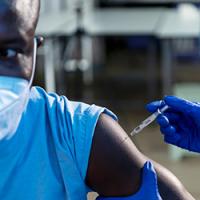
It’s time to sharpen those pencils and crack open the books and laptops again! School looks a little different for everyone this year – kids, teachers, and parents alike. Despite where your children will be attending school, in a school or at home, it is important to stay on track with your well check appointments and vaccines, especially the flu vaccine. “Whether or not your children are returning to school for in person school, a hybrid schedule or remotely it is still very important that they receive their flu vaccine. By receiving the flu vaccine, you can help protect yourself, your family, your classmates and your community from the flu,” says GRMDC Nurse Manager Chekesha Carter, RN, BSN.
The flu vaccine is important every year, but 2020 has brought additional importance to receiving the shot: the emergence and spread of COVID-19. “While the flu and COVID-19 are two very different viruses, getting the flu vaccine can help relieve the burden for health care workers and hospitals responding to this pandemic saving valuable health care resources,” Chekesha adds.
Who Should Receive the Flu Vaccine?
Governor Baker has mandated that all children 6 months or older attending child care, pre-school, kindergarten, grade school, high school, or college in Massachusetts receive the vaccine by the end of the year. Additionally, people who are consideredhigh risk for flu complications should get a flu vaccine which include, young children, pregnant women, people with certain chronic health conditions like asthma, diabetes or heart and lung disease and people 65 years and older. For children we recommend receiving your shot in September or October to get protection for the height of the season. However, for older patients or patients with underlying health issues, please consult with your physician to determine the best time for you to get your shot.
“It can be daunting to think about seeing the doctor and keeping up with routine vaccinations during this season of COVID-19, but routine checkups are more important than ever. Vaccines help keep our children from getting serious illnesses so you can stay safe and away from the hospital. This is especially important for the flu vaccine as we start to head into the colder months in Boston. Nobody wants to go to the emergency room because of a child with fevers this winter, so stay on track with your children's vaccines!” Dr. Paul Ahn, MD GRMDC Pediatrician
How To Prevent the Flu
The flu is easily spread through droplets in the air by an infected person, or if you touch a surface where someone has sneezed or coughed. You can prevent contracting and/or spreading the flu by washing your hands with soap and water – remember to wash for at least 20 seconds. Cover your mouth and nose if you cough or sneeze. Avoid touching your eyes, nose and mouth. And please continue to wear a mask in public areas and social distance. According to the CDC, “people with the flu are most contagious in the first three to four days after their illness begins.”
